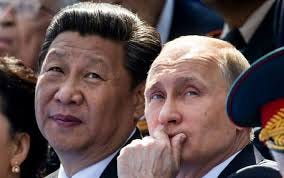This is my latest which can be seen at Englesberg Ideas :) Hope you enjoy it :)
We live at a time when tumultuous political events dominate the news cycle. Whether it is President Trump’s indictment, Liz Truss’ record-breaking premiership, or riots in France, liberal democracy looks on the edge. Writers such as Yascha Mounk and William Galston have been shouting about the potentially perilous political symptoms and solutions that could abate such a threat. But perhaps our attention with dysfunction and danger at home has been misplaced, after-all despite appearances authoritarian regimes regularly suffer from the type of dysfunction we fear may happen.
Unlike democracies which roll with the rough and tumble of politics, autocratic systems narrow contestation presenting a united homogenous front inside the country. The leader may be pictured doing traditional customs of their country, showing themselves as ‘one of the people’ or run sham elections where they win 90+% of the vote, demonstrating how much they are loved and needed by their country. Despite these tactics, fundamentally, political opposition is kept in check not by the will of the people but by the barrel of the gun. Rather than creating stability, the mix of coercion, political narrowness, and one-person rule leads not to stability but chronic instability with disastrous consequences for all involved.
Dictators such as Putin, Assad, and Kim Jong Un rest their legitimacy on the premise that they and they alone can deliver stability and prosperity to their people. Rooted in the Hobbesian premise that by relinquishing your liberty and centring order under an almighty sovereign, you’ll avoid an environment which is ‘nasty, poor, solitary, brutish and short’. Of course, if dictators had read Hobbes beyond this description they’d realise he was recommending caution when exercising the powers a sovereign gains. Rather than recommending a totalitarian approach to government as is sometimes supposed, Hobbes desired homogenous unity in the political sphere facilitated by an ultimate power. This may have been a reasonable bet in 17th-century England but is it really likely in the 21st century?
One author who many turn to when answering this question is Carl Schmitt. Schmitt, most infamous for his joining the Nazi Party and being named briefly the ‘crown jurist of the third Reich’, is still used by anti-liberals on both the left and right. Schmitt’s focus on homogeneity as an expression of the ‘friend-enemy’ dichotomy grounding politics re-imagines conflict at the heart of politics. The ‘friend-enemy’ dichotomy is not a mere difference of opinion. In Schmitt’s eyes, it represents a physical threat from the ‘other’, and it is his belief liberal democracy is ill-equipped to manage political relations.
Schmitt’s solution to his assessment of political conditions proclaiming sovereign rule to ‘represent’ and protect the people in a ‘caesarist’ manner. Believing that the sovereign acts as a ‘guardian’ of the political order, Schmitt’s solution to liberal frailties proclaimed the ‘Sovereign is he who decides on the exception’. Using emergency powers temporarily to ‘protect’ the political order has little safeguard from the emergency turning into a permanent state of affairs without a strong liberal and democratic element balancing the dictator’s power. Combined with Schmitt’s manichean vision of politics, it is no surprise that Schmitt’s proclamation has horrified and inspired over the past 90 years.
Keep reading with a 7-day free trial
Subscribe to Theory Matters to keep reading this post and get 7 days of free access to the full post archives.


